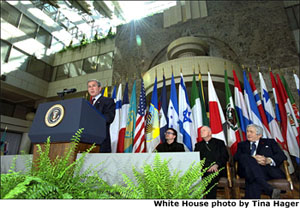
- Afghanistan
- Africa
- Budget Management
- Defense
- Economy
- Education
- Energy
- Environment
- Global Diplomacy
- Health Care
- Homeland Security
- Immigration
- International Trade
- Iraq
- Judicial Nominations
- Middle East
- National Security
- Veterans
- President's Cabinet
- USA Freedom Corps
- Faith-Based & Community Initiatives
- Office of Management and Budget
- National Security Council
- USA.gov
|
Home >
News & Policies >
Policies in Focus >
Helping Developing Nations
|
The Millennium Challenge Account President Bush called for “a new compact for global development, defined by new accountability for both rich and poor nations alike. Greater contributions from developed nations must be linked to greater responsibility from developing nations.” The President pledged that the United States would lead by example and increase its core development assistance by 50 percent over the next three years, resulting in an annual increase of $5 billion by FY 2006. Background At the Inter-American Development Bank on March 14, 2002 President Bush called for “a new compact for global development, defined by new accountability for both rich and poor nations alike. Greater contributions from developed nations must be linked to greater responsibility from developing nations.” The President pledged that the United States would lead by example and increase its core development assistance by 50 percent over the next three years, resulting in an annual increase of $5 billion by FY 2006. These funds will go into a new Millennium Challenge Account (MCA). Because sound policies are an essential condition of development, the President announced that the Millennium Challenge Account will be “devoted to projects in nations that govern justly, invest in their people and encourage economic freedom.” Administration
The MCA will be administered by a new government corporation designed to support innovative strategies and to ensure accountability for measurable results.
Country Eligibility
Funding for the MCA will increase over three years to $5 billion per year in FY 2006. The number of countries eligible to compete for funding will also increase over this period. Specifically:
Performance Indicators In his March 14 speech President Bush directed that countries be identified based on “a set of clear and concrete and objective criteria” that would be applied “rigorously and fairly.” The President stated that the Millennium Challenge Account will “reward nations that root out corruption, respect human rights, and adhere to the rule of law... invest in better health care, better schools and broader immunization... [and] have more open markets and sustainable budget policies, nations where people can start and operate a small business without running the gauntlets of bureaucracy and bribery.” The following 16 indicators (with sources), chosen because of the relative quality and objectivity of their data, country coverage, public availability, and correlation with growth and poverty reduction, will be used to assess national performance relative to governing justly, investing in people, and encouraging economic freedom. Governing Justly:
Investing in People:
Promoting Economic Freedom:
Performance Assessment The indicators will be used to identify better performing countries. Because a straight ranking determined by adding together the scores for all sixteen indicators might allow exceptional performance in some areas to outweigh dismal performance in others, countries will qualify as better performers only if they demonstrate commitment in all three policy areas. Accordingly:
Final Selection Qualifying as a better performer will not guarantee MCA support. There may be gaps or lags in the data, or trends not reflected in the data, which may be material for assessing performance. The MCA Board of Directors will make a final recommendation to the President. In so doing, the Board will be:
|
|||||||||||||||||||||



